Garden trends 2016. Which ones are going to last? What will add wow factor to your garden?
And having decided which new ideas you like – how do you actually achieve the effect you want?
Garden fashion kicks off every year at the RHS Chelsea Flower Show. But long-term trends don’t necessarily emerge until the show is over. They take time to filter down.
I reviewed hours of Chelsea coverage on TV, online and in the press (it’s a tough job but someone has to do it) to see which ideas resonated with lots of different kinds of people.
The result was a mix of ‘headline’ trends, and new ideas ticking along quietly in the background.
I have also sourced where and how to get the trends into your own garden. There are some affiliate links, which means that if you click on the product links to buy, I may get a small fee.
Garden trend 1: Rocks
This is certainly a ‘headline trend’. The Daily Telegraph counted 84 massive rocks in this year’s Chelsea gardens. And there were many more smaller stones. Rocks were at the heart of many Gold medal winning gardens including Cleve West’s evocation of Exmoor in the M&G Garden and Andy Sturgeon’s Best in Show.
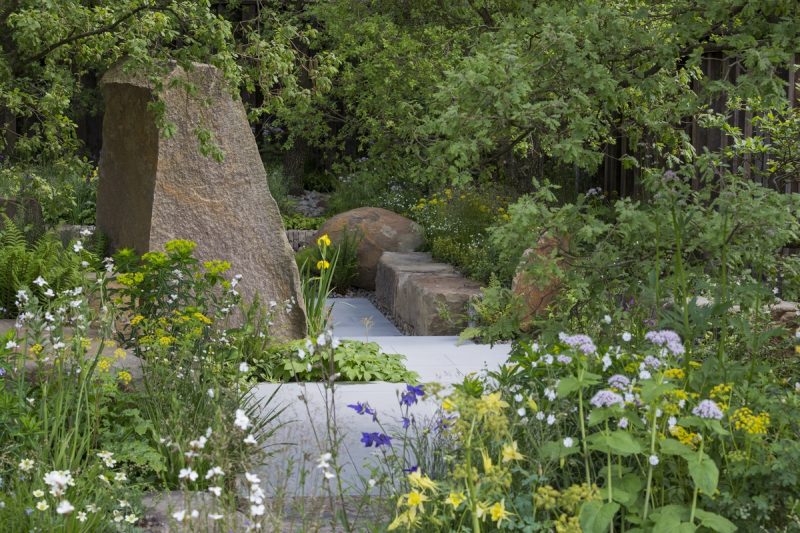
The M&G Garden. Designed by Cleve West. Sponsored by
M&G. Sponsored by: M&G. RHS Chelsea Flower Show 2016.
But are rocks right for your garden? And how would you find them?
Are you going to be balancing a huge rock on top of your pergola as one show garden did? Personally I have too nervous a disposition. And we have a walled town garden accessed by a very narrow (walled) Medieval alleyway, so rocks are not top of my own garden shopping list.
But I do think this is a trend with a future.
Rock gardens are long overdue for a comeback. (I dimly remember when even the tiniest gardens had rock gardens. In the 1950s and 60s, I think air raid shelters were often converted to rock gardens, which may have accounted for their popularity).
Garden consultant Matt Jackson master-minded the renovation of Doddington Place’s 1920s rock garden. He has also just used rocks to renovate a dingy corner at his home in Exmoor.
‘Rocks will work in your garden if they’re there for the right reason and are carefully considered,’ he says. ‘They really come into their own if you’ve got, for example, a tricky bank that needs underpinning.’
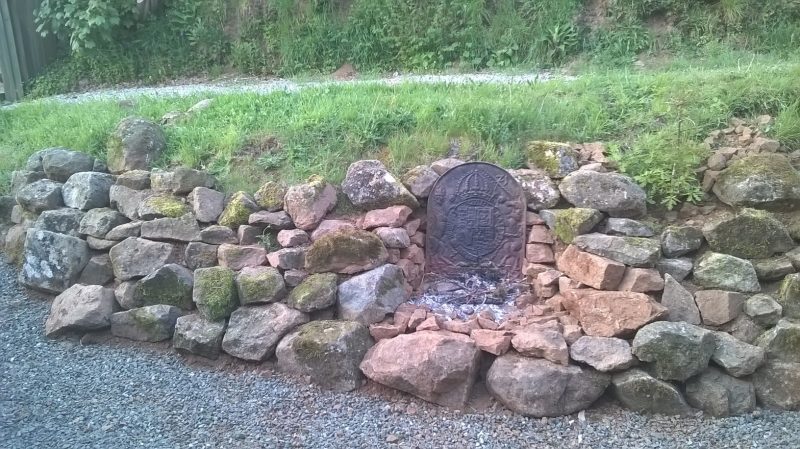
This was a sloping bank outside Matt’s holiday cottage Kelly Mill. By using rocks and a fireback, he has turned a muddy corner into a private terrace for Kelly Mill guests to sit out or barbecue.
The main issue with rocks is transporting them. ‘Rock isn’t expensive’ explains Matt. ‘But once you’ve costed in the hire of a digger and/or crane, the costs of transporting it from the quarry and the services of someone who can place it exactly where you want it, then you are looking at £300-£500 or more for a single large boulder.
If you want ten large boulders, it’ll probably cost a bit less per boulder. And you may want to use a professional landscaper to source it and make sure it’s done exactly right, which could double that cost or more.’
Cleve West’s M&G Garden’s inspired by the Exmoor landscape combined rough-hewn natural rock with precision-carved stone. There would be additional costs for precision carving.
Matt suggests you contact a local quarry or builder’s merchants to source large rocks. Many builders’ merchants have a deal with a local quarry and should be able to help you.
Visit the Kelly Mill website here.
Garden trend 2: the garden path
Garden paths used to be decided by your budget. At the top was York stone, then Indian sandstone, brick, concrete pavers or gravel according to your wallet. It is no longer that simple!
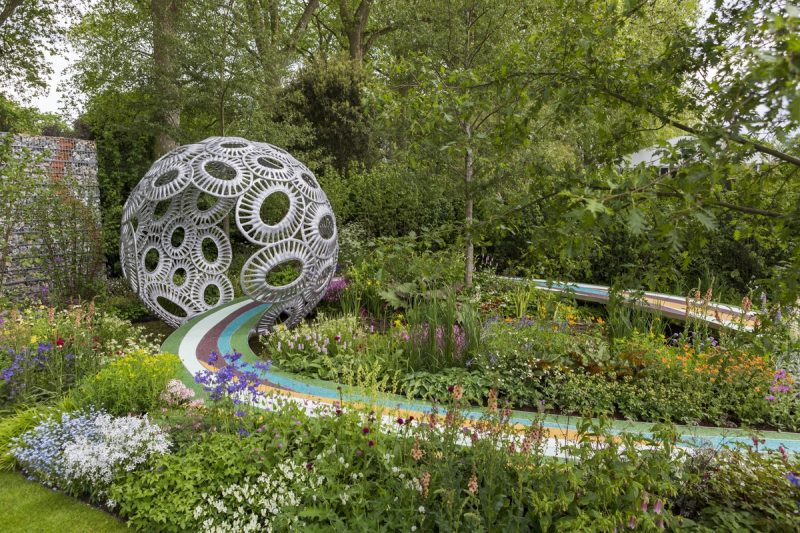
The Brewin Dolphin Garden – Forever Freefolk.
Designed by Rosy Hardy. Sponsored by: Brewin Dolphin.
RHS Chelsea Flower Show 2016.
I don’t know if you’ve tried to buy a plain yoghurt recently. You can get 0% fat, low-fat, super-creamy or pro-biotic and every possible kind of fruit, crunch, oat or rice addition. Not ordinary plain yoghurt.
The simple choices in garden paths may be consigned to wherever plain yoghurts have gone.
At RHS Chelsea 2016, we saw coloured paths (like the one above), reflexology paths, paths that matched the fencing, jigsaw paths and even minimalist paths (in the Beauty of Mathematics garden, the whole garden was planted into gravel and the path was where the plants weren’t).
I think this is a fab trend for middle-sized gardens because we can often see our paths from the house. A good path can give a garden structure and focus. In the winter, the path will be even more important, so it’s worth spending time and money on making it special.
Matt Jackson agrees. ‘You can be hugely creative with paths – I’ve seen people use shells, tiles on edge and glass bottles with the bottoms up. I’ve recently seen a pebble path designed to look like a flowing river. And my favourite garden feature of all time is the brick path winding through the orchard at Great Dixter.’
If you decide you want a coloured path, then Matt advises that you google ‘bonded gravel’ (it’s similar to what tennis courts are made of).
There are hundreds of colours on the market, and many companies will give you lots of advice on installation. They often also have lists of customers who will let you see the paths in their gardens, to give you an idea of how it will look.’
When it comes to brick or pebbles, Matt thinks an amateur can make just as good a job of laying a path as a professional, because they’ll be less obsessed with perfection. ‘You need to research how to do it, but it isn’t difficult and often the slight imperfections of the amateur path are what makes it charming.’
Garden trend 3: copper, bronze, corten steel
Copper has been a major design direction in the home over the last two years, and now it’s big in the garden. That includes copper-hued metals such as bronze and corten steel too, giving that burnished copper/bronze/rusted effect.
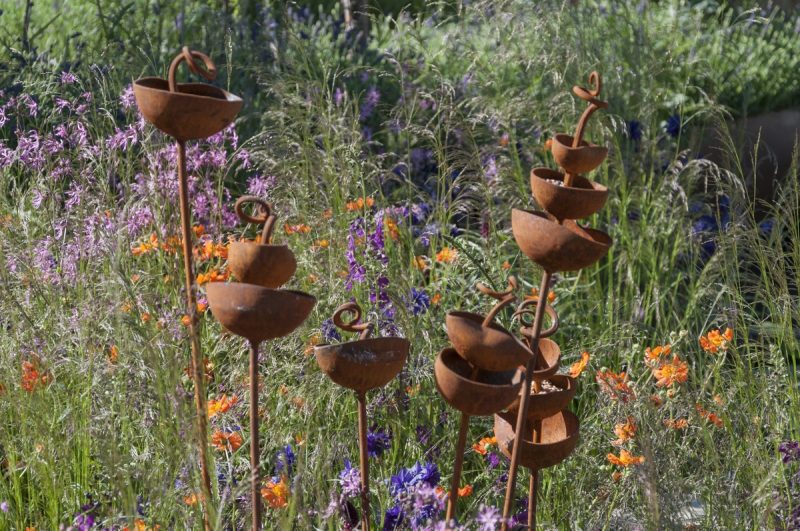
Health Happiness &
Horticulture. RHS Hub. Bird feeders and wildlife. RHS Chelsea
Flower Show 2016.
If you want a quick garden update, then a couple of copper, bronze or corten steel planters would probably do it.
You could try a few copper bucket planters, such as these Burnished Copper XL Bucket Garden Planters
Or go for a larger corten steel trough – you could use it as a water feature or planter:
90/30/80cm Andes Tall Slim Trough Corten Steel Planter/Tree Pot/Garden/Garden/Window Box
Or even go for the huge corten steel trough – which you can use as a planter or pond: 300/150cm Corten Steel Pond Water Feature/Garden/Patio Fish Pool
Garden trend 4: Loose airy pruning of trees
I am a huge fan of ‘transparent pruning’, so I was delighted to notice how many trees in show gardens at Chelsea had airy, graceful outlines, including the silver birches in Andy Sturgeon’s Best in Show, Cleve West’s M&G Garden, the trees in Jo Thompson’s Chelsea Barracks Garden and the hawthorns in Rosy Hardy’s Forever Freefolk Garden
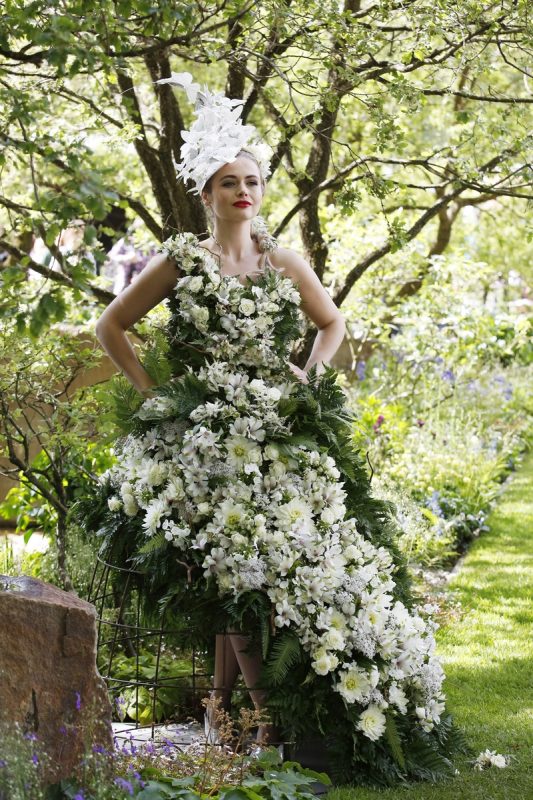
A model poses in a dress of flowers and foliage designed by Cleve West in the M&G garden at the RHS Chelsea Flower Show 2016 in London, UK Monday May 23, 2016. RHS / Luke MacGregor
You really know you’re a gardener when you’re more interested in the pruning of the tree behind the model than you are in the dress…
Garden consultant Posy Gentles specialises in ‘transparent pruning’. She has just reduced a silver birch in our garden by about 30% in height. The tree is still a beautiful shape, but there is so much more light coming through.
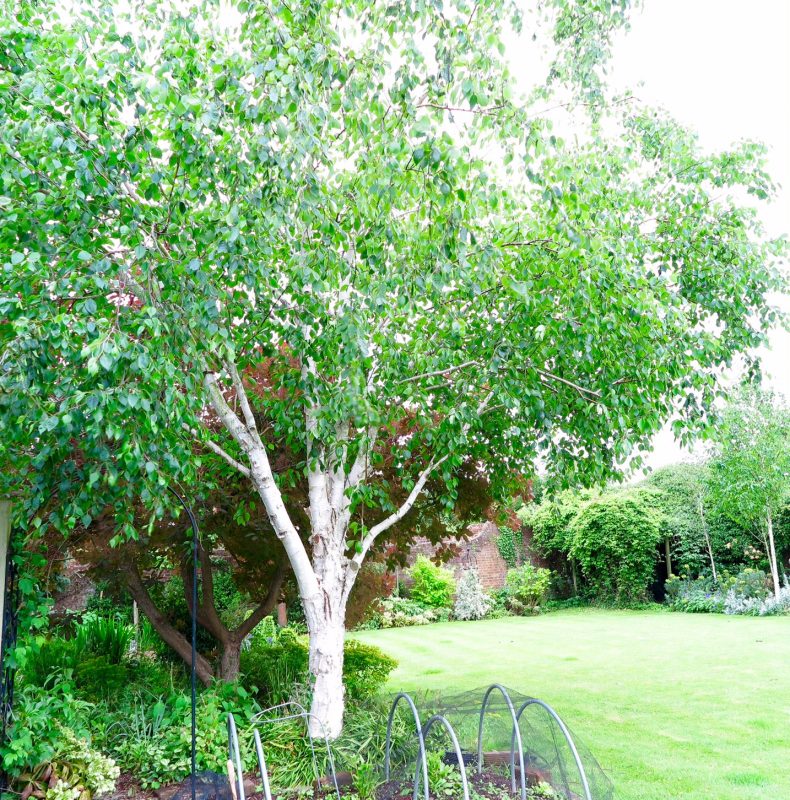
Our silver birch the day after Posy pruned it. It looks completely natural and has retained its shape, but it is actually about 15-20ft lower.
Firstly, you need a really knowledgeable gardener or tree surgeon. Secondly, ask them to thin the tree out, cutting branches where they meet main branches.
If you get a man with a chain saw simply to cut straight across branches, you will lose the natural shape of the tree. And you will get thick, ugly regrowth which will make your tree look dense.
Garden trend 5: strong block colour
Strong blocks of colour – mainly orange or purple – were seen at RHS Chelsea 2016 from L’Occitane’s Provencal garden’s purple tablecloth, a bright orange shipping container converted to a garden shed, the purple benches and purple water feature in the Sensory Garden.
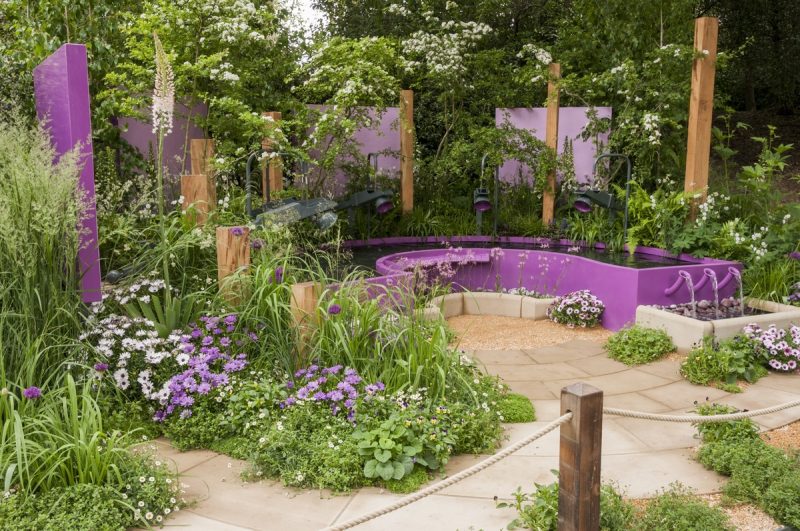
Papworth Trust – Together We Can.
Designed by Peter Eustance. Sponsored by:
Papworth Trust. RHS Chelsea Flower Show 2016.
If you want a shipping container in your garden, by the way, there is a whole sub-culture dedicated to the purchase and re-use of them. Wiki-how has a good post on it here
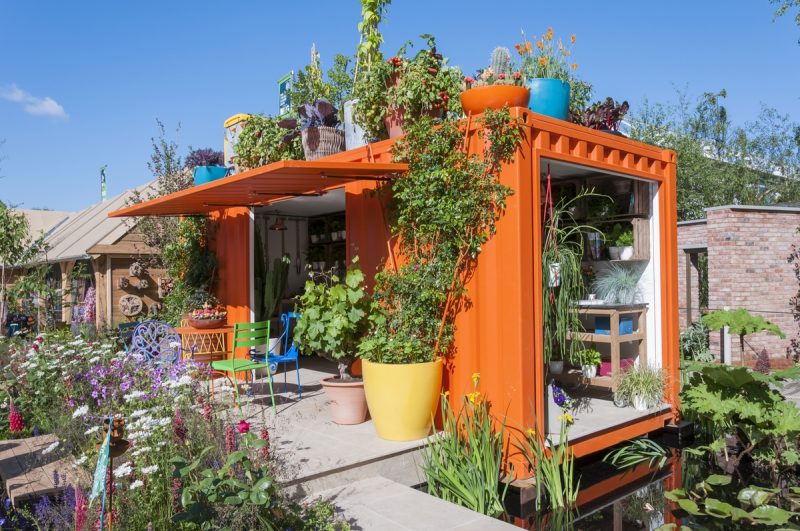
Health Happiness &
Horticulture. RHS Hub. Roof top, vegetables, kitchen gardening. RHS Greening Grey Britain
garden. Designed by Anne Marie Powell.
Sponsored by: Outdoor Room. RHS Chelsea
Flower Show 2016.
Shipping containers are another thing that won’t fit down our narrow Medieval access path, but if you have easy access for cranes, they could be a stylish extra room in your garden. Most storage companies that rent shipping containers will also sell them, so google them in your area.
This photo also shows the direction garden colour is taken. Although strong brights, such as orange and purple, were big at Chelsea this year, you could also see pretty pastels too. A very strong direction and one that is easy to do.
You could paint furniture, pots or benches you already have. There are a wide range of outdoor paints – the ones below have orange or purple
Rust-Oleum AE0160019E8 400ml Gloss Universal Spray Paint – Sunset Orange
And chalk paint can be used on any surface, indoors or outdoors. It can offer the soft pretty colours:
Duck Egg Blue Chalk Based Furniture Paint great for creating a shabby chic style. 250ml
Trend 6 (or is it?): planters dropped into table tops
The BBC presenters at RHS Chelsea 2016 did their links sitting in front of a low table with pots of erigeron dropped into it. With the erigeron frothing out of the top of the table (the pot was concealed below the table top) it looked like such a simple, delightful treatment.
But it is not.
I have asked Mr Middlesize, who is very handy, if he could cut some holes in our garden table. He has explained that it would be really difficult. You would probably need to make the table from scratch, cutting the holes in the top at an early stage.
And I have scoured the internet for ‘garden tables with holes cut in them.’ Don’t bother – unless you can think of a better search term.
I have, however, seen this idea out there, so if you’ve done it successfully let me know. Unless we can all do it in our own gardens without too much difficulty or expense, it won’t last as a trend. But somehow I do think we’ll be seeing a bit more of it. In the meantime, I am going to just have the erigeron in a pot. Lovely!
Meanwhile do join us every Sunday morning by signing up in the box (top right) and if you’ve found this interesting, do please share using the buttons below. Thank you!
The post Garden trends 2016 – the best ideas for YOUR garden appeared first on The Middle-Sized Garden.
from The Middle-Sized Garden http://www.themiddlesizedgarden.co.uk/garden-trends-2016-best-ideas-garden/
No comments:
Post a Comment